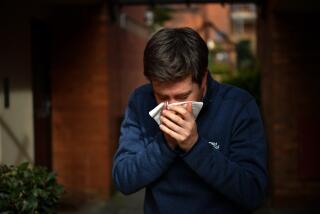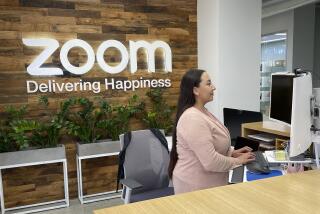Companies grapple with mounting fears over virus
- Share via
Chicago-area real estate agent Brenda Ferdman was visiting a client’s home when she did something far more alarming than take a few photos.
She started to cough.
The client was taken aback. “She was very concerned that I had the swine flu,” Ferdman said. “I assured her that it was just an allergy.”
As the number of confirmed cases of swine flu grows, corporate America is grappling with how best to keep healthy employees well and at work and sick ones home in slimmed-down workplaces.
Blast e-mails with tips from the Centers for Disease Control and Prevention are prevalent. Managers are making sure bathrooms are stocked with paper towels. Antibacterial hand sanitizers are being placed where employees interact with the public.
So far though, it appears that many employers aren’t willing to relax sick leave and vacation policies, but discussions of nonpunitive liberal-leave policies are taking place behind closed doors, said Russell Robbins, a senior clinical consultant at Mercer.
Robin Imbrogno, who owns the Human Resource Consulting Group in Seymour, Conn., said, “Over the years we’ve had situations where a company could afford to grant a day off or pick up day-care costs.
“But today is a different economy. Those are expenses on top of employee benefits, on top of paid time off, on top of sick-leave time. To throw one more piece of benefit into that mix is just going to push everyone over the top.”
Many companies have put the brakes on corporate travel. Kraft Foods Inc. of Northfield, Ill., has suspended employee travel to, from and within Mexico. Other companies, including Motorola Inc. of Schaumburg, Ill.; Air Products and Chemicals Inc. of Allentown, Pa.; and Century City-based Northrop Grumman Corp.’s shipyard in Newport News, Va., are limiting travel to Mexico to crucial trips.
Because of the international bent of its business, Air Products has more than 400 health response officers to monitor conditions and help workers prepare for outbreaks.
“We’ve looked at what . . . if we had X number of people who were quarantined?” spokeswoman Beth Mentesana said. “What are the measures that we have to take to maintain operations?”
Companies also want managers and employees to be on the lookout for flu-like symptoms, but that discussion can be tough.
There is, for instance, the question of how to handle employees who don’t feel well but would rather not use their sick days. Sears Holdings Corp. and Aetna Inc., for instance, are allowing people to work from home in those circumstances.
“Stay home, that is definitely the message,” said Walgreen Co. spokeswoman Tiffani Washington.
The drugstore chain sent an e-mail this week advising employees at its Chicago-area headquarters to sanitize their work surfaces, avoid crowds and try to use public transit at off-peak hours. It is supplying employees in its 6,736 stores with hand sanitizers and disinfectants, but is not yet calling for them to wear masks or gloves.
“They’re on the front lines,” Washington said.
--
Brian Callaway, Bob Channick, Veronica Chufo, Lynn Doan and Mike Hughlett contributed to this Tribune Newspapers report.
More to Read
Inside the business of entertainment
The Wide Shot brings you news, analysis and insights on everything from streaming wars to production — and what it all means for the future.
You may occasionally receive promotional content from the Los Angeles Times.










